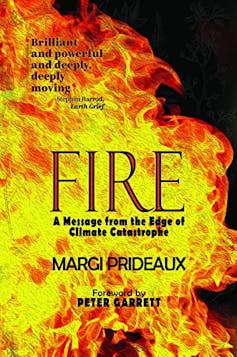two new books clarify what's at stake if we fail to mitigate climate change
- Written by Kate Crowley, Adjunct Associate Professor, Public and Environmental Policy, University of Tasmania

The Australian Black Summer fires of 2019-2020 were unspeakably grim. Twenty-four million hectares were burnt, 33 people died, and over a billion animals perished.
In Fire: A Message from the Edge of Climate Catastrophe[1], Margi Prideaux tells us that on Kangaroo Island, which lies off the Australian mainland, just south-west of Adelaide, 211,500 hectares were burnt, two human lives were lost – a fire-fighting father and son – and 60,000 farm animals died.
But so much more was lost as the Kangaroo Island community sought to save itself from the monster fire that was started by a lightning strike, burst into two pyrocumulonimbus clouds[2], and devoured everything before it at lethal, unstoppable speed.
It will take years before the toll on the island’s biodiversity is fully understood, not least because these fires burned “hotter, deeper and were far more extreme” than its landscape has adapted to.

















